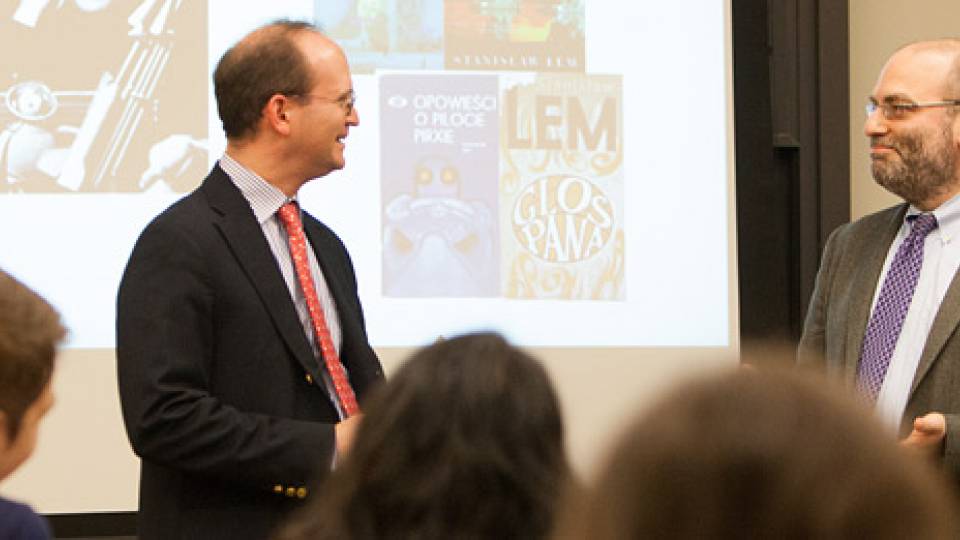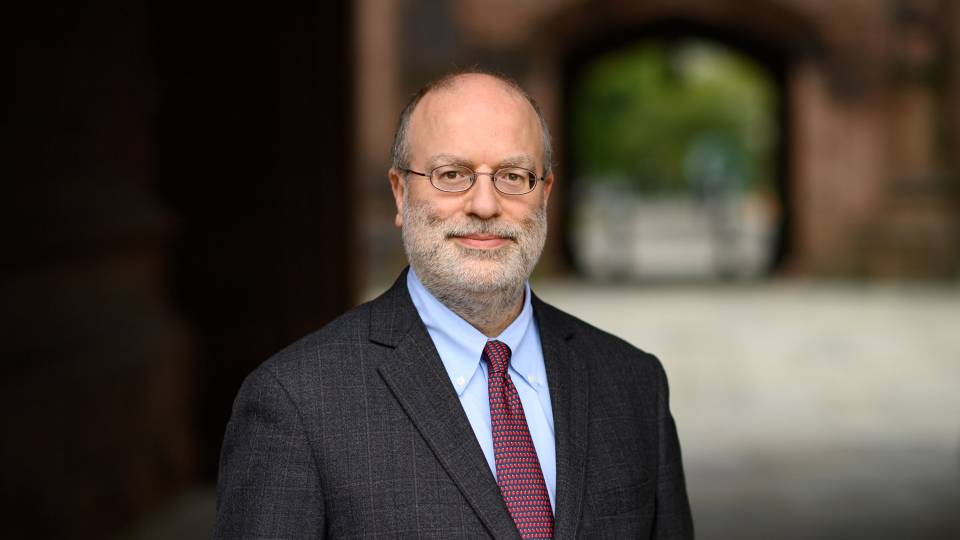Four Princeton faculty members have been named the recipients of Graduate Mentoring Awards by the McGraw Center for Teaching and Learning and will be honored during the Graduate School's hooding ceremony on Monday, May 30, at Princeton Stadium.
They are: Michael Gordin, professor of history; Michael Jennings, the Class of 1900 Professor of Modern Languages and professor of German; Jennifer Rexford, professor of computer science; and Nicole Shelton, associate professor of psychology.
The McGraw Center, together with the Graduate School, instituted the mentoring award in 2002 to recognize Princeton faculty members whose work with graduate students is particularly outstanding. It is intended to honor faculty members who nurture the intellectual, professional and personal growth of their graduate students.
Graduate students nominate faculty members for the award and, along with faculty members, serve on the committee that selects the winners. One faculty member in each academic division (engineering, humanities, natural sciences and social sciences) is chosen. In addition to being honored at the ceremony, each receives a $1,000 award and a commemorative gift.
Gordin, who joined the Princeton faculty in 2003 and directs the Program in Russian and Eurasian Studies, specializes in the history of the modern physical sciences and Russian history. Since July 2010 he has served as the director of graduate studies for the Program in the History of Science. He has written on topics including the introduction of science into Russia in the early 18th century, the history of biological warfare in the late Soviet period, the relations between Russian literature and science, and the life and chemistry of Dmitrii Mendeleev, formulator of the periodic system of chemical elements. Since coming to Princeton most of Gordin's research has focused on the history of early nuclear weapons, both American and Soviet. Gordin's course topics include the history of modern science, technology and society, translation in the history of science, nuclear weapons history, the history of pseudoscience, the Soviet science system and biography.
"Michael's greatest contribution has come … in his simple willingness to offer his own analytical gifts to students with interests very far from his own," one student wrote in nominating Gordin for the award. "His own panoramic interests and seemingly inexhaustible scholarly energy make him willing to think about almost any historical question. In choosing a supervisor, I knew that Michael would offer more to my research and professional development than most scholars. … So far he has proven me right."
Jennings, who chairs the Department of German and joined the University faculty in 1981, focuses his research and teaching on 20th-century European literature, photography and cultural theory. He is the author of a study of German writer Walter Benjamin and the general editor of the standard English-language edition of Benjamin's works, as well as the editor of "The Writer of Modern Life," an edition of Benjamin's writings on French poet Charles Baudelaire. Jennings' course titles have included "Reading Photographic Writing," "Neoavantgarde and Politics in the Long 1960s," "Theories of Historicist Interpretation," "Modernism and Modernity: Literature and the Visual Arts in France and Germany 1848-1914" and "Theory of Mass Culture in the Frankfurt School."
In their letters of nomination, current and former students praised Jennings' holistic approach to his role as teacher and mentor: "Professor Jennings has been a model teacher for me -- a teacher in the broadest sense of the word: He has taught me not only about German and European culture, but also about the academic profession," wrote one student. "He has taught me to ask the right research questions, educating me not only in German culture but also in the very field of study of German. … It is this awareness of the discipline at large -- of its history and trends -- that Professor Jennings emphasized in our discussions."
Rexford, who joined the Princeton faculty in 2005 after nearly nine years at AT&T Research, focuses on Internet routing, network measurement and network management. The goal of her research is to make data networks easier to design, understand and manage. Rexford received her bachelor's degree in electrical engineering from Princeton in 1991. Her course topics include advanced computer networks and Internet routing.
In addition to her deep and thorough technical proficiency, students repeatedly praised Rexford's passion for mentorship and attention to the nuances of such guidance. Calling Rexford a "fantastic mentor," one student wrote, "She shares my insatiable passion for details and practical problems. Her patience, willingness to consider new ideas and ability to explain complicated concepts make her a fun person to work with and should serve as a model for every adviser. … She has also been a teacher, a useful sounding board and a continual source of sound advice."
Shelton, who came to Princeton in 2000, studies interracial and interethnic relationships, with a particular focus on the perspective of those targeted by prejudice and discrimination. Shelton has examined social interactions between whites and ethnic minorities, exploring how interpersonal concerns about issues of prejudice influence the dynamics of intergroup contact. Additionally she has been exploring personality and situational factors that influence the development and maintenance of cross-racial friendships. Her course topics include introductory social psychology, social stigma, research methods and close relationships.
"I particularly appreciate the combination of instruction and intellectual freedom that Nicole gives her students," one student wrote. "She is a natural teacher, always giving thoughtful and informative answers to questions, introducing new theoretical or practical perspectives on our projects, and correcting my errors or misconceptions graciously. She often passes along tips that she learned as a graduate student from her advisers, teaching me how best to design a study, make our research educational for participants or introduce a talk. Moreover, she is receptive to my ideas and encourages me to pursue topics of particular interest to me."

